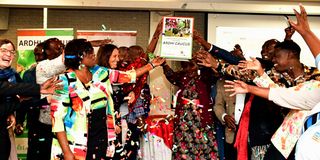The rise of movements championing women's land rights

Delegates during the launch of Ardhi Caucus Strategy at Jacaranda Hotel, Westlands, Nairobi, on July 19, 2024.
What you need to know:
- Kenya Land Alliance has launched Ardhi Caucus, drawing membership from the public and private sector, as well as academia and research institutions.
- In 2022, Landesa launched Stand for Her Land in Africa initiative, a campaign that involved more than 100 civil society organisations.
Last week, Kenya Land Alliance launched Ardhi Caucus, drawing membership from the public and private sector, as well as academia and research institutions. They intend to advance access to justice for women in land conflict situations.
In 2022, Landesa launched Stand for Her Land in Africa initiative, a campaign that involved more than 100 civil society organisations across Kenya, Uganda, Senegal, Tanzania, and Ethiopia. It seeks to promote women’s land tenure.
Esther Mwaura-Muiru, the initiative’s global advocacy director, thanked the movement of Karamojong traditional leaders in Uganda for organising themselves to push for women land rights. In Senegal, religious leaders are supporting the cause too.
In 2021, ministers from seven countries under the umbrella of Intergovernmental Authority on Development (Igad) signed “Igad Regional Women’s Land Rights Agenda (2021–30)”, a framework meant to accelerate implementation of the AU declaration on land issues and challenges in Africa.
Pro-women land rights movements have emerged in recent years, serving as catalysts for ending inequalities in ownership, access and use of land in Africa.
An analysis of the Kenya Demographic and Health Survey (2022) shows that at the time of the study, 75 per cent of women did not own agricultural land, yet the majority of (75 per cent) of farmworkers are women, according to the International Labour Organisation. Neither did 93 per cent of them possess non-agricultural land.
Since 2021, various initiatives and commitments have been made towards promoting women’s right to access, use, inherit, control, and own land.
Ardhi Caucus provides a united voice to advance gender-responsive land justice systems in Kenya.
KLA chief executive officer Faith Alubbe said two of the thematic issues they seek to tackle are complexities involved in women’s pursuit of land justice and barriers frustrating their full enjoyment of land rights.
“We have two themes on women: the first one is, access to land justice for women, men, youth and persons with disabilities; and the second is women’ land rights. The rest are on protection of communally held land, tenure security for small-holder farmers, and climate change adaptation and mitigation, all of which affect women directly or indirectly,” she said during the launch on July 19, 2024 in Nairobi.
She explained that ambiguous procedures, arbitrary decisions and high transactional costs hinder women from possessing land, a barrier they would address through holding land clinics in the counties to ease access to land services.
“Although the Constitution allows women to own land, socio-cultural practices have made it difficult for them to own land. We must encourage a dialogue between men and women to abolish the gender norms that hinder equitable access to land resources,” she added.
In 2022, Landesa also rolled out a Stand for Her Land in Africa initiative, involving more than 100 civil society organisations across Kenya, Uganda, Senegal, Tanzania, and Ethiopia.
Ms Mwaura-Muiru told Nation.Africa earlier that the movement had yielded fruit. “In Uganda, Karamojong traditional leaders have organised themselves to push for women land rights. In Senegal, we are seeing religious leaders support the cause too," she said.
In 2009, heads of African countries made a declaration in which they committed to ensuring equitable land access for all land users and improving access and security of land tenure for women.
In endorsing the agenda, the ministers responsible for land, gender, and women affairs in Djibouti, Ethiopia, Kenya, Somalia, South Sudan, Sudan, and Uganda reaffirmed their commitment to executing the framework by allocating the land sector more money.
“[We] reaffirm our commitment to promoting cross-country collaboration and learning on gender and land, including facilitating knowledge and skills transfer,” they said in a joint communique upon endorsing the agenda on July 28, 2021.





